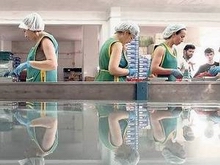 "We are unaffected by the crisis," says Nektarios Marathakis, who stands proudly next to pallets full of his organically grown courgettes, cucumbers and peppers. Recently he travelled over 3000 kilometres from the Greek island of Crete to convince traders and customers of his products at the Fruit Logistica in Berlin. Marathakis is co-founder of the growers union Aspersa, which sells fruit and vegetables from around 140 organic growers in Crete. "In the last year our turnover increased by 35 percent," according to Marathakis.
"We are unaffected by the crisis," says Nektarios Marathakis, who stands proudly next to pallets full of his organically grown courgettes, cucumbers and peppers. Recently he travelled over 3000 kilometres from the Greek island of Crete to convince traders and customers of his products at the Fruit Logistica in Berlin. Marathakis is co-founder of the growers union Aspersa, which sells fruit and vegetables from around 140 organic growers in Crete. "In the last year our turnover increased by 35 percent," according to Marathakis. The basis for the growers' success is export, especially to Austria and Germany. "Now Aspersa sells around 70% of the produced organic products abroad. In 2013 we want to make it 80 percent," says Marathakis. Through middlemen and wholesalers his organic products end up at German supermarket chains such as Rewe, Edeka and Aldi.
At his fair stall in Berlin Marathakis tells us how he sees the crisis in his everyday life. The situation in Greece is only getting worse. Recently around 5000 people in Athens fought over fruits and vegetables that traders were handing out on the streets. And growers from Crete used to process the vegetables that didn't meet EU standards (curved cucumbers or odd tomatoes) to animal food. "Nowadays poor families come to us every day, begging for what we can't sell," says Marathakis. Many people ask for jobs in his production hall. Some of them may soon get lucky, as Aspersa is building a new production hall at the moment, as the old hall is no longer big enough due to the large demand. This new hall will be put into use before the end of this year, which should generate around 50 new jobs.





